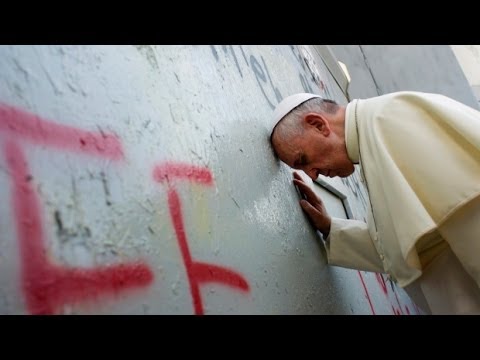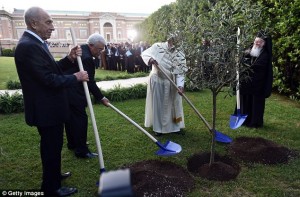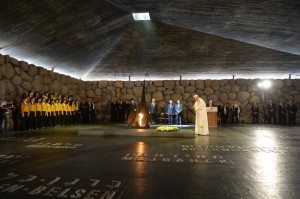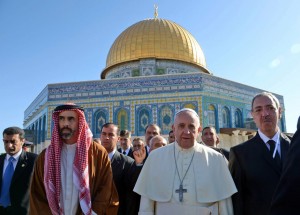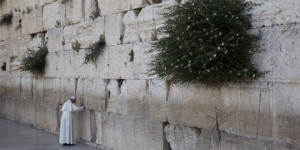“Depart from evil, and do good; seek peace, and pursue it” [Psalm 34:14, NRSV]
[L] Pope Francis prays at the wall that divides Israel from the West Bank. [R] The pope, the two leaders and Patriarch Bartholomew planting an olive tree.
Walls demarcate. Walls vacate dialogue. Walls perpetuate a divide built on violence.
Always seeking peace, Pope Francis during his brief tour of the Middle East in May 2014, made an unscheduled stop at a section of the dividing wall that separates Israel from the West Bank in the city of Bethlehem. He put one hand on the wall and leaned over it, touching the wall with his forehead. It was an unprecedented gesture. But the world could tell that this holy man of peace prayed fervently for peace in the region where the absence of peace remains a protracted and agonising reality.
On a trip intended as a “pilgrimage for peace,” with its roots in faith and not politics, Pope Francis later visited the Yad Vashem Holocaust Museum and prayed for the victims of the Holocaust. The following day, he also visited the Muslim Dome of the Rock located on the Temple Mount in the Old City of Jerusalem. Also at the Temple Mount area, he prayed at the Western Wall, Judaism’s holiest site, and left a piece of paper in the Wall, on which he wrote the Lord’s Prayer.
. Politicians are wont to give their preferred spin on the Pope’s gestures, but that in no way diminishes the truth that his peace-making attempts are always spiritual bridge-building, not political posturing. In this twenty-first century world, what nations and their political leaders need is a willingness to step away from their trench-digging political manoeuvring. They need to ease up on their rigidity, to allow a bit of the spiritually positive dimension – the yearning for peace – that every human person is fundamentally gifted with, to emerge in their handling of political affairs. Without easing up on rigidity, no nation with a violent past is ever going to taste real peace, and we can only despair of ever seeing any world peace any time soon.
Two examples intrude upon our consciousness.
The first is Turkey. While Armenia commemorated its 150th anniversary of the Armenian Holocaust in the hands of the Turks and the whole world expressed empathy with Armenia, the Turkish nation has chosen to hold steadfast to its denial that a holocaust of the Armenian people ever happened.
The problem is, for political leverage, most specifically in securing Turkey’s strategic cooperation in any armed conflict in the Middle East, the United States of America and its European allies have chosen to stay mute, refusing to acknowledge in public what they would only whisper in private to be the truth of history. Upon its denial, Turkey will never find peace on the Armenian issue.
The second is Japan. Unlike Germany, which could and did courageously accept the historical reality of the Nazi atrocities and own up the nation’s infamous role in the Second World War, Japan remains steadfast in a strategy of denial-at-all-costs, for face-saving and so that her future generations would not have to be “weakened” by any sense of shame of her atrocious past. And so, whereas Germany could recover and progress and, crucially, go on to rebuild a new nation of peace and prosperity, enjoying the praise and trust of all nations, Japan too, seemingly could and did go on to rebuild and grow into a rich and prosperous country but, one has to be blind as a bat to not notice a crucial difference between these two nations. With her ill-conceived attempts to cover up, and even to blatantly distort her horrible war crimes, Japan, unlike Germany, could never enjoy peace with and respect from her neighbouring nations. Resorting to such strategies as doctoring school history text books, political dignitaries openly paying respects and honouring their “war heroes” at the Yasukuni Shrine [including 1,068 war criminals!], rejecting claims relative to the enslavement of Korean “comfort women”, and denying the historicity of the Nanjing Massacre, even to the point of raising official objections against the UNESCO World Memory Heritage recognition of the Nanjing Massacre documents, the Japanese, as a whole, are simply mendacious and untrustworthy people in the eyes of her neighbours!
The Japanese have yet to learn that facts are stubborn things. In 1770, John Adams, who later became one of the most influential American presidents, was asked to help provide a legal defense for the British soldiers involved in the Boston Massacre. He accepted the brief knowing that his fellow colonists were hostile to the troops and his legal practice would probably suffer. Despite obvious risks to his personal welfare on account of the dominant political fervour, he earned admiration from fellow Americans and beyond in his firm defense submission, saying:
- I will enlarge no more on the evidence, but submit it to you, gentlemen – Facts are stubborn things; and whatever may be our wishes, our inclinations, or the dictates of our passions, they cannot alter the state of facts and evidence: nor is the law less stable than the fact. If an assault was made to endanger their lives, the law is clear, they had right to kill in their own defence.
Duplicitous in the face of crimes against humanity, the United States of America in its political posturing risks being seen by the world as the ultimate “rogue” nation. Memory is still fresh of an image of President George Bush, Jr. having the gumption to label American-selected nations in such terms as “the axis of evil”. In politics, duplicitous protagonists do not blush. Fighting at all fronts to maintain world supremacy, American strategy against the world is grounded on their coveted twin pillars, imaginary or real, of “American exceptionalism” and world economic and military “dominance”. When world “supremacy” is the operative word in its unabashedly declared perennial agenda, fighting at all fronts and at all costs to maintain that supremacy consumes the USA, especially as it perceives threats to that dominance from emerging “powers”. World “dominance” is the American national idol and recent history has shown that it would not hesitate to start wars and invade nations on grounds upon which it argues justification. In the process, the American national idol wrecks far more violence upon humanity than private idols and household gods. The American “war god” subscribes to what Wright Mills’ suggestive description of a “military metaphysic” by which he means a way of construing every national aspiration or international problem in distinctly military terms. America is hands down the singularly most insolent “empire” in the contemporary world. It meddles in different regions of the globe, profiting from divisions and discords, and promoting the same in the name of “the national interests and security” of the USA. In service of its desired dominance, which includes the strategy of using some nations to balance other emerging power, America is at this very moment in history, engaging in the very dangerous game of supporting Japan to be an active military power in Asia again. For some time now, America has been and is the biggest world plague. The whole world knows that the USA is anything but a nation of peace, both within its borders as well as in its foreign policies. From the path that it takes, peace will not be its constant companion any time soon.
And what about practitioners of world religions in this regard?
Reverend Dr Sam Wells has this to say:
- “There’s no point talking about religion in general – there’s no such thing. What we’re interested in is how distinguished thinkers from Jewish, Muslim and Christian communities come to terms with their legacy of hatred and violence towards themselves, one another, and the world at large, and what wisdom they can bring to forging a better path, for the good of each respective tradition and wider society.”
During his visit to the Holy Land last year, Pope Francis made an unprecedented call for peace:
- “In this, the birthplace of the Prince of Peace, I wish to invite you, President Mahmoud Abbas, together with President Shimon Peres, to join me in heartfelt prayer to God for the gift of peace,” he said. “I offer my home in the Vatican as a place for this encounter of prayer.”
In June 2014, Pope Francis brought together the presidents of Israel and the Palestinian Authority at the Vatican to join in prayer and promise to seek peace — though their governments were officially not talking. Israeli President Shimon Peres and Palestinian leader Mahmoud Abbas concluded the two-hour ceremony by kissing each other on the cheek and then planting an olive tree, gestures intended to signal a commitment to trying to end one of the longest-running, most intractable conflicts in the world.
[L] Pope Francis at the Yad Vashem Holocaust Museum. [M] Pope Francis visits the Dome of the Rock. [R] Pope Francis seen touching the stones of the Western Wall
To be sure, no one is presumptuous enough to think peace would break out any time soon through this effort. But, Pope Francis is clear about what a call to peace entails. “Peacemaking,” he said, “calls for courage, much more so than warfare. Instill in our hearts the courage to take concrete steps to achieve peace.”
In his peace effort, Pope Francis evinced an intention to mix spiritual matters and real-world diplomacy. “The intention of this initiative is to reopen a road that has been closed for some time; to re-create a desire, a possibility; to make people dream,” he said.
During the service, Jewish, Christian and Muslim prayers were recited in English, Italian, Arabic and Hebrew. The words were intended to thank God for His creation, to seek forgiveness for the failure to act as brothers and sisters, and to ask for peace in the Holy Land. Peres, who was 90 and nearing the end of his seven-year term as Israeli president, expressed a desire for peace in every human heart:
- “I was young, and now I am old. I experienced war, I tasted peace. Never will I forget the bereaved families — parents and children — who paid the cost of war. And all my life I shall never stop to act for peace, for the generations to come. Let us all join hands and make it happen.”
Making a momentous event, the leaders then planted an olive tree.
Copyright © Dr. Jeffrey & Angie Goh, January 2016. All rights reserved.
You are most welcome to respond to this post. Email your comments to jeffangiegoh@gmail.com. You can also be dialogue partners in this Ephphatha Coffee-Corner Ministry by sending us questions for discussion.

